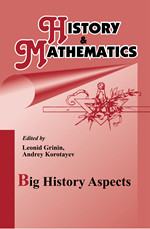
|
History & Mathematics:Big History AspectsBibliography: Volgograd: ‘Uchitel’ Publishing House, 2019. – 344 pp.
Edited by: Leonid E. Grinin, and Andrey V. Korotayev
ISBN 978-5-7057-5464-9 Editorial Council: Herbert Barry III (Pittsburgh University), Leonid Borodkin
(Moscow State University; Cliometric Society), Robert Carneiro (American
Museum of Natural History), Christopher Chase-Dunn (University of California,
Riverside), Tessaleno Devezas (University of Beira Interior), Jack A. Goldstone
(George Mason University), Leonid Grinin (National Research University
Higher School of Economics), Antony Harper (Eurasian Center for Big History
& System Forecasting), Peter Herrmann (University College of Cork, Ireland),
Andrey Korotayev (Higher School of Economics), Alexander Logunov
(Russian State University for the Humanities), Georgy Malinetsky (Russian
Academy of Sciences), Sergey Malkov (Russian Academy of Sciences), Charles
Spencer (American Museum of Natural History), Rein Taagepera (University of
California, Irvine), Arno Tausch (Innsbruck University), William Thompson
(University of Indiana), Peter Turchin (University of Connecticut), Douglas
White (University of California, Irvine), Yasuhide Yamanouchi (University of
Tokyo).
|

Our Yearbook ‘History and Mathematics’ has already celebrated its 10th anniversary and has confidently entered its second decade. The common feature of all our Yearbooks, including the present volume, is the usage of formal methods and social studies methods in their synthesis to analyze different historical phenomena.
The present Yearbook (which is the seventh in the series) is subtitled ‘Big History Aspects’. This issue is devoted to the problems of evolutionary development of the world. In no way will it be a digression from the direction which we have initially defined for our Yearbook, but just an extension of the scope of the research. The matter is that there are two kinds of history: the history of nature (or more exactly the Universe and the Earth) and the history of humans and mankind. It is not surprising that the idea of historicism pene-trated almost every scientific field. At the same time the search for common foundations of this endless in its diversity world has intensified. One of the directions of this interdisci-plinary search for the unity of the world in its diversity is Universal Evolutionism (Big History). Mathematical and formal methods help to understand much deeply both natural and human history.
This issue of the Yearbook consists of four main sections: (I) Patterns of Big History; (II) Hypotheses of Deep Big History; (III) Biological Aspects; (IV) History and Future of Social Systems.
We hope that this issue will be interesting and useful both for historians and mathemati-cians, as well as for all those dealing with various social and natural sciences.